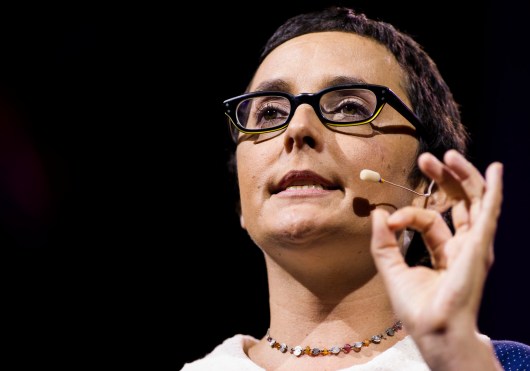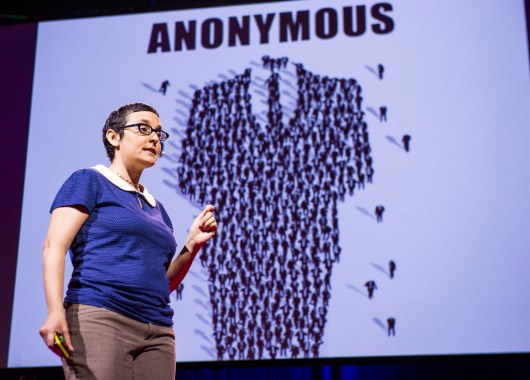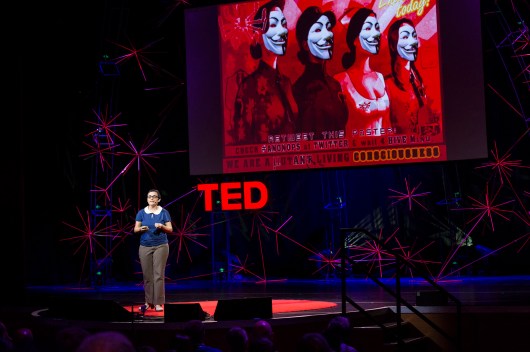Anthropologist and academic Gabriella Coleman starts her talk with a simple-sounding question: “Who is Anonymous?” She promptly confesses that even after “exhilarating and extremely frustrating” years of studying the group, she still finds this question difficult to answer.
First of all, it’s not an organization with one or even a few leaders at the helm. It’s a name adopted by various unrelated groups of hackers and technologists to describe a whole range of actions, from hacks against security firms to technical support for occupiers to those involved in national revolutions. Subgroups such as Antisec, meanwhile, scour servers to look for sensitive national, military or political information they can leak to the world. What links the groups is a spirit of irreverence and disdain for the law as it stands.
It all starts with Internet trolling, a long-established habit in Internet circles. “Generally this contains a combination of four things: pranking, trickery, deceit and defilement,” says Coleman. Essentially a way to harm someone’s reputation, it often included the release of personal information, even the assault of an individual or company with unpaid-for pizzas. What’s the point? The laughs, or as Anonymous might put it, the “lulz.”
Declared the Internet Hate Machine by Fox News, a name Anonymous entirely embraced, the group has become more serious in recent years. What inspired them? Oddly, the church of Scientology. When they demanded that a leaked recruitment video be taken down, Anonymous got mad — and bombarded Scientology churches with free pizzas (and many other things besides). As an Anonymous member who taught Coleman’s class described it, it was “ultra coordinated motherfuckary.”
And it was at this point that a serious discussion began within Anonymous. Soon enough, it was clear that a political movement had been born. “Participants now saw themselves as bona fide activists–with an admittedly transgressive twist,” she says.
Not all geeks are members of Anonymous, or even agree with the group’s tactics. Yet together they have been an explosive force, and she has four ways to describe more about who they might be:
1. Anonymous scales and is participatory; it is not just hackers. 2011 was the “summer of endless hacks,” she acknowledges. The CIA website was taken down (again). PBS was defaced after an interview with Bradley Manning. “But the hacking is only one weapon among many,” says Coleman. Anonymous does many other things too, including distributing press releases, creating videos, designing propaganda posters.
And while technical elites certainly have authority within Anonymous, there are no barriers for participation. “All it takes is to self-identify as Anonymous,” says Coleman, saying that we could all declare ourselves right now (the audience doesn’t seem so tempted). But the scale and reach is not limited to any kind of hierarchy.
2. Anonymous may seem chaotic, but most targets are not random. Anonymous has names and reasons. “They may not be good reasons, but they exist,” says Coleman. Their most infamous operation humiliated HBGary CEO Aaron Barr, after Barr had boasted that he had infiltrated Anonymous and was ready to hand over names to the FBI. Anonymous instead gutted HBGary’s servers of 70,000 corporate emails. Operation BART happened after the transport agency blocked cell phone reception to block a planned protest. “Just yesterday, there was an operation in Japan after the country passed anti-piracy laws,” Coleman says. “Anonymous is not proactive, it is reactive, event-driven. It rises up most forcefully when internet freedom is in jeopardy.”
3. They put on a good performance, obvious even to their detractors. The political art of Anonymous is spectacle, says Coleman. The group has a formidable PR machine, which becomes a PR nightmare for others. Yet here’s the thing: Spectacle alone won’t engender political change. Perhaps the greatest accomplishment of all the spectacle, Coleman posits, is that “they dramatize the importance of anonymity and privacy in an era when both are rapidly eroding. Given that vast databases track us, given the vast explosion of surveillance, there’s something enchanting, mesmerizing and at a minimum thought-provoking about Anonymous’ interventions.”
4. They are visible and invisible. Unlike criminal groups that stay hidden at all costs, Anonymous allegedly announces itself loud and proud. It has received enormous attention, fear and admiration — it won the People’s Choice award on Time magazine’s online poll and was voted the top cybersecurity threat by IT professionals. Yet they’re also evasive and shifty. “It is hard to know how many people are involved,” says Coleman, thanks in part to an internal culture of avoiding personal fame at all costs. Hackers who have risen in visibility are chastised, marginalized, even banned. It’s difficult to know who did what when or how. What’s clear is that even though Anonymous members are so paradoxical and contradictory, “they have tapped into a deep disenchantment with the status quo as concerns censorship privacy and surveillance.”
This is why it doesn’t really matter whether Anonymous as it exists even lasts. Roiled by arrests and paranoia, the group may well implode. But, says Coleman firmly, “irreverent dissent on the internet is not going to go away with Anonymous.” Many geeks and hackers care about protecting the Internet, and they both invent and manage these resources, so it’s not surprising that this movement is under way. It might be difficult to come up with a blanket moral assessment of Anonymous’ influence, but it’s clear that this is just one moment. And, concludes Coleman, “if you try to hurt what’s so valuable about the internet, be careful — because the internet may very well hurt you back.”
Photos: James Duncan Davidson



Comments (13)
Pingback: Thinking about Hacking, Anonymous, and Free Speech | David in Carroll Land
Pingback: Anonymous (group) | AJ Jtt
Pingback: Anonymous (group) | The Usual Sources
Pingback: Devin Morrow Post 5
Pingback: 20 Media Links that Changed my Life - Lifehack
Pingback: Share » Just another Banoosh site » Anonymous’ ‘Your Anon News’ Raises $54,668 On Indiegogo To Start A New News Site
Pingback: The Computer Boys Take Over
Pingback: Mega web roundup | Somatosphere
Pingback: Fünf des Tages – 02.07.2012 | nevermore
Pingback: is this ARG? » Blog Archive » isthisarg.org Social Media Digest for July 2nd
Pingback: Bradley Manning Newslinks 28 June 2012 « William Bowles.info